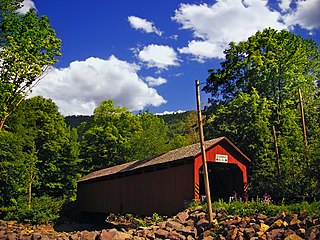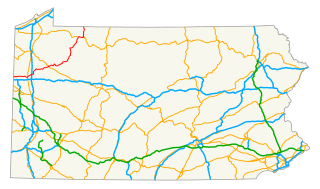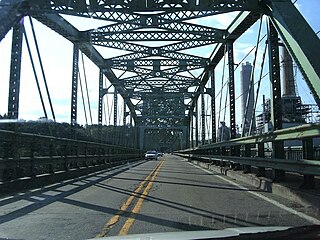
A covered bridge is a timber-truss bridge with a roof, decking, and siding, which in most covered bridges create an almost complete enclosure. The purpose of the covering is to protect the wooden structural members from the weather. Uncovered wooden bridges typically have a lifespan of only 20 years because of the effects of rain and sun, but a covered bridge could last 100 years.

The Siegrist's Mill Covered Bridge is a 102-foot (31 m), Burr Arch Truss covered bridge over Chiques Creek between Rapho and West Hempfield townships, Lancaster County in U.S. state of Pennsylvania. Owned and maintained by the county, its official designation is the Big Chiques #6 Bridge.

A truss bridge is a bridge whose load-bearing superstructure is composed of a truss, a structure of connected elements usually forming triangular units. The connected elements may be stressed from tension, compression, or sometimes both in response to dynamic loads. Truss bridges are one of the oldest types of modern bridges. The basic types of truss bridges shown in this article have simple designs which could be easily analyzed by 19th and early 20th-century engineers. A truss bridge is economical to construct because it uses materials efficiently.

The Philadelphia & Reading Railroad Bridge carries Norfolk Southern rail lines across the Susquehanna River between Cumberland County, Pennsylvania and Harrisburg, Pennsylvania. Some of its concrete piers encase stone masonry piers from an earlier truss bridge on this site, completed in 1891 by the Philadelphia, Harrisburg and Pittsburgh Railroad, which was then acquired by the Philadelphia and Reading Railroad to connect its Harrisburg and Lurgan lines. The current structure was constructed from 1920 to 1924 by replacing the trusses with concrete arches one track at a time. The bridge has fifty-one concrete arches, three more than the nearby Rockville Bridge.

The Birmingham Bridge is a bowstring arch bridge in Pittsburgh, Pennsylvania, which crosses over the Monongahela River. The bridge connects East Carson Street on the South Side with Fifth and Forbes Avenues going to Uptown, Oakland, and the Hill District. It is named in honor of the English city of Birmingham and also for the neighborhood it connects to, which was once called Birmingham, now a part of the South Side. Many locals also may refer to it with its unofficial name, the 22nd Street bridge.

Wendel Bollman was an American self-taught civil engineer, best known for his iron railway bridges. Only one of his patented "Bollman truss" bridges survives, the Bollman Truss Railroad Bridge in Savage, Maryland. The Wells Creek Bollman Bridge near Meyersdale, Pennsylvania is also standing, although that bridge uses the Warren truss system.

The Carl E. Stotz Memorial Little League Bridge, formerly known as the Market Street Bridge, carries approximately 27,700 vehicles a day on U.S. Route 15 over the West Branch Susquehanna River between Williamsport and South Williamsport in Lycoming County, Pennsylvania in the United States. It is the seventh bridge on the site and was built at a cost of over $60,000,000.

The Riverside Avenue Bridge is the only cast-iron bridge in Connecticut and one of a small number still in use in the United States. It carries Riverside Avenue over the New Haven Line railroad tracks in the Riverside section of Greenwich, Connecticut. The bridge was part of an earlier span built in 1871 over the Housatonic River by the New York and New Haven Railroad, and when that bridge was replaced, part of it was erected in Riverside in 1895. It was placed on the National Register of Historic Places in 1977.

The Sonestown Covered Bridge is a Burr arch truss covered bridge over Muncy Creek in Davidson Township, Sullivan County, in the U.S. state of Pennsylvania. Built c. 1850, the bridge is 110 feet (34 m) long, and was placed on the National Register of Historic Places (NRHP) in 1980. The bridge is named for the nearby unincorporated village of Sonestown in Davidson Township, and is also known as the Davidson Covered Bridge. It was built to provide access to a gristmill, which operated until the early 20th century.

The Golden Hill Bridge is a historic bridge on Golden Hill Road over the Housatonic River in Lee, Massachusetts. It is a lenticular pony truss bridge built c. 1885 by the Berlin Iron Bridge Company, and is the state's oldest surviving bridge of this type. It is one of only five Berlin Co. bridges in the Berkshires, and is the only known surviving bridge to implement modifications to the pony truss design patented by William O. Douglas in 1885. The bridge was listed on the National Register of Historic Places in 1994.

U.S. Route 62 is a signed north-south U.S. Highway in Pennsylvania, which runs diagonally southwest-northeast through the industrial northwestern part of the state. Although initial portions of the route opened in 1926 in other areas of the country, U.S. 62 was not designated in the commonwealth until 1932. The highway connects the small cities of Sharon, Franklin, Oil City, and Warren to larger markets, such as Youngstown, Ohio and Buffalo, New York.

The Barryville–Shohola Bridge is the fifth generation of bridges constructed over the Delaware River at the communities of Shohola Township, Pennsylvania and Barryville, New York. The bridge serves both communities, with two major state legislative highways, Pennsylvania Traffic Route 434 and New York State Touring Route 55. The bridge itself is 812 feet (247 m) long and is 23 feet (7.0 m) wide, using four total spans across the river. It is maintained by the NY–PA Joint Interstate Bridge Commission, which is jointly owned by the states of New York and Pennsylvania.

The Hadley Parabolic Bridge, often referred to locally as the Hadley Bow Bridge, carries Corinth Road across the Sacandaga River in Hadley, New York, United States. It is an iron bridge dating from the late 19th century.

The Senator Robert D. Fleming Bridge, commonly known as the 62nd Street Bridge, is a truss bridge that carries Pennsylvania Route 8 across the Allegheny River between the Pittsburgh neighborhoods of Morningside and Lawrenceville and Sharpsburg, Pennsylvania.

The Brownsville Bridge, also known as the Intercounty Bridge and the West Brownsville Bridge, is a truss bridge that carries vehicular traffic across the Monongahela River between Brownsville, Pennsylvania and West Brownsville, Pennsylvania. Since the opening of the Lane Bane Bridge and highway project to carry much of the intercounty through traffic away from the main streets of downtown Brownsville in the early 1960s, another commonly heard name is Old Brownsville Bridge for the four high level viaduct.

Pennsylvania Railroad, Connecting Railway Bridge is a stone arch bridge in Philadelphia, Pennsylvania, that carries Amtrak Northeast Corridor rail lines and SEPTA and NJT commuter rail lines over the Schuylkill River. It is located in Fairmount Park, just upstream from the Girard Avenue Bridge.

The Charleroi-Monessen Bridge, officially the John K. Tener Memorial Bridge, is a two lane structure spanning the Monongahela River. The bridge connects North Charleroi in Washington County, Pennsylvania and Monessen in Westmoreland County, Pennsylvania. The structure connects Route 88 on the west bank of the river and Route 906 on the east side. The bridge, which opened in 2013, replaced a 1906 structure. The original bridge was closed in 2009 due to structural deficiency.

The Masontown Bridge is a four-lane concrete plate girder bridge that carries vehicular traffic across the Monongahela River between Masontown, Pennsylvania and Monongahela Township, Greene County, Pennsylvania (near Carmichaels by way of Pennsylvania Route 21.

The Winooski River Bridge, also known locally as the Checkered House Bridge, is a historic Pennsylvania through truss bridge, carrying U.S. Route 2 (US 2) across the Winooski River in Richmond, Vermont. Built in 1929, it is one of only five Pennsylvania trusses in the state, and was the longest bridge built in the state's bridge-building program that followed massive flooding in 1927. The bridge was listed on the National Register of Historic Places in 1990.


























